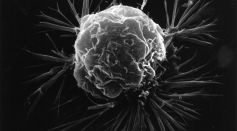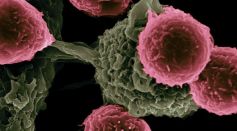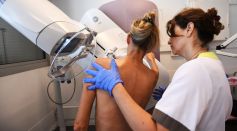Tags: Cancer

Sore Throat During Winter Season: Is it Still a Common Cold or a Symptom of a Serious Health Condition?

81-Year-Old Woman with Mesothelioma Possibly Got Her Illness from Asbestos She Encountered Decades Ago

Silver Bullet for Cancer Metastasis Found by Princeton Researchers: Disables Gene in Human and Mice Tissue

Medicine Could Put an End to Asthma, Infertility, Human Papillomavirus Infection and More Diseases, Study Says

Cancer Cells Discovered to Disarm Attackers Using Nano Tentacles to Deplete Immune System

Long-Term Consumption of Food Products with Palm Oil Promote Tumor Growth Throughout the Body
Irritable Bowel Syndrome: 39-Year-Old Woman With Terminal Illness Misdiagnosed Due to IBS and Colon Cancer's Similar Symptoms
HPV Vaccine Proven Effective as Rates of Cervical Cancer Decreased to 87%

Groundbreaking Multi-Cancer Screening Blood Test Can Diagnose 50 Types of the Deadly Disease Even Before Symptoms Appear

High Effectiveness of Immunotherapy Against Squamous Cell Carcinoma Leads to Better Outcomes

Breast Cancer Vaccine for Triple-Negative Result: First-of-Its-Kind Human Trial Set for Launch

43-Year-Old Man Had His Right Eye Removed Due to Cancer With Symptoms of Watery, Irritated Eye
Women With Menopause Taking Hormone Replacement Therapy Has Increased Risk of Developing Cancer

Two Types of Hypertension Medications Recalled Due to High Levels of Cancer-Causing Substance

5 Hours of Physical Exercise a Week Could Lessen the Risk of Having Cancer, Study Says
Cervical Cancer Screening Approaches are Lacking and Too Much for Women at the Same Time, Study Says
Caterpillar Fungus May Help Kill Tumor Cells; Clinical Trial Results Reveal Presence of Molecule That Can Be Used as Anti-Cancer Drug

The Princess Royal Officially Opens Pioneering Centre For 'Darwinian' Cancer Drug Discovery

New Breast Cancer Risk Prediction Tool Can Aid in Earlier Diagnosis, Reduced Mortality Among Black Women

Why Is Cancer Care So Expensive? Treatment for the Deadly Disease Costs the US More Than $156 Billion Annually
Most Popular

Starlink Satellite Explodes in Orbit; SpaceX Confirms It'll Re-Enter Earth

Will Earth's Magnetic Poles Flip Next? Magnetic Pole Reversal Explained Through Cutting‑Edge Magnetosphere Science

What Causes Monsoons? How Seasonal Winds Shifts and Climate Patterns Drive Rainfall

How Lightning Science Reveals Why Charged Storms Are Rising with Global Warming Effects





